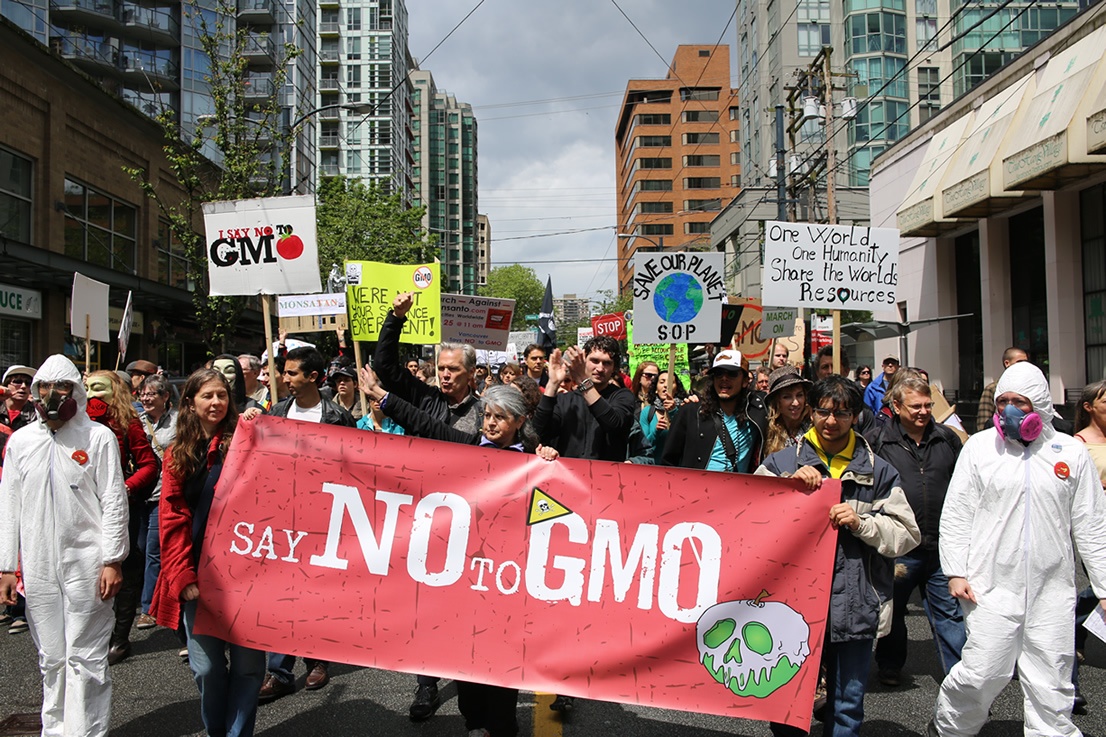Will I ever stop writing about Monsanto, its GMOs and other shenanigans? Probably not, at least not this week.
In the latest outrage, Monsanto has written a $4.6 million check and raised pledges for millions more from interested parties, to defeat Washington state’s GMO labeling initiative on the November ballot. The Monsanto campaign now has a kitty of $11 million.
There are some unsettling similarities in the campaign against Washington’s Initiative 522 campaign and last’s year’s Proposition 37 GMO labeling campaign last year in California. Monsanto, Hershey’s and other agribusiness giants spent $44 million to narrowly defeat the California proposition, vastly outspending pro-labeling advocates and once again “protecting” the public from the truth about genetically modified organisms in our food.
Pesticide giants Dupont and Bayer CropScience have donated $3.2 million and $562,000 respectively to the anti-labeling campaign in Washington.
Washington’s Initiative 522 would require retail food products and seed stocks that have been produced with the help of genetic engineering to be clearly labeled as such. Several types of products are exempt, including alcoholic beverages, restaurant foods, medical foods and non-GMO animal products, regardless of whether the animals were fed genetically engineered feed.
Washington state supporters of labeling cites mainstream research on the negative environmental impacts of genetically engineered crop farming and has asked leading health food manufacturers to explain how easy and inexpensive it is to change food labels.
On its website, the Monsanto-led group argues that labeling GMO foods will increase food costs, hurt farmers and saddle taxpayers with the expenses of a costly bureaucracy.
So why do these agri-giants want to keep us from knowing that there are fish genes in our tomatoes or herbicides in our corn seeds that had spawned new generations of super weeds or pesticides that have caused mutated insects unaffected by stronger and stronger pesticides?
I always follow the money trail. Monsanto and its friends have spent untold millions to control the U.S. and global food market. Think about this: 88 percent of all corn in the U.S. and 94 percent of all soy comes from genetically modified seeds, according to the U.S. Department of Agriculture.
While most of that corn and soy is used for animal feed, according to Bill Freese of the Center for Food Safety, an anti-GMO organization, “60-70 percent of processed foods have ingredients derived from GMOs.”
Washington’s Initiative 522, if passed, would be the first state law to require GMO labeling in the U.S.
China, Saudi Arabia, South Korea, countries in the European Union, Japan, Australia, New Zealand, Russia, India and Chile already require GMO foods to be labeled.
Meanwhile, back at the ranch on Capitol Hill, our Congress and Senate are hard at work protecting Monsanto and its partners in crime, yet again.
You may remember last May’s Monsanto Protection Act that granted Monsanto and other agri-giants legal protecti0n to continue selling their products even if the courts decide these products are dangerous.
Set to expire at the end of September, the Monsanto Protection Act is back before Congress. The original act was part of a continuing resolution that kept the government operating for another six months. Those types of bills are often attached to major funding resolutions and they frequently disappear when or if Congress wakes up.
Yet there is a powerful lobby to keep the Monsanto Protection Act and there are enough legislators who are likely to vote for another three-month continuation.
I encourage you to raise your voice against The Monsanto Protection Act by calling or writing your member of congress and senator and let them know that we consumers expected them to protect us and the environment from the harmful effects of GMOs.
There is some hope. Even spending tens of millions of dollars to keep consumers in the dark, Monsanto and its accomplices know that consumers will eventually win. Twenty-six states have introduced bills to require GMO food labeling. Every day that Monsanto and friends keep consumers in the dark and protect the self-serving agribusiness lobby is another day of massive profits. Monsanto’s house of cards will inevitably collapse in time, but not before the company has made billions of dollars on Frankenfoods and probably not before there is serious damage to the environment and to our health.







